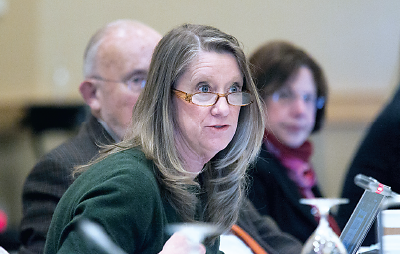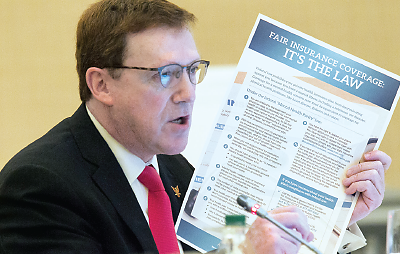If a suitable property and purchase price can be found, APA will move into a new headquarters building in Washington, D.C., after the Association’s current lease in Arlington, Va., ends in December 2017.
That’s what APA’s Board of Trustees approved at its meeting last month after an in-depth presentation on a range of options reviewed by the Ad Hoc Work Group on Real Estate. Frank Brown, M.D., APA treasurer and chair of the work group, summarized those options as staying in the current building, seeking another rental space, or purchasing an existing or new building in Washington, D.C., or the surrounding area. The recommendations were reached after consultation with financial, legal, and real estate consultants.
Trustees opted for the purchase of a new or existing building in the District of Columbia for several reasons: the importance of proximity to Capitol Hill for advocacy, the historically strong performance of real estate values in the District of Columbia, the ability to control use of space and influence the design of the property, and the potential financial option of having tenants leasing space in a purchased property that exceeds APA’s space needs.
Real estate consultants also presented six potential buildings for purchase in the District. The process of identifying which one, if any, will best meet APA’s office needs is under way, with the intention of presenting options to the Board at its March meeting.
Expanding the IPS Scientific Committee
In other news, Trustees voted to approve the expansion of the Scientific Program Committee of the Institute on Psychiatric Services (IPS). The committee will now consist of 12 members instead of six to put it on par with the annual meeting’s Scientific Program Committee. Also, at least 50 percent of the committee members must have attended at least three IPS meetings to ensure continuity in the meeting.
In comments to Psychiatric News, APA President-elect Renȳe Binder, M.D., said she believes that the IPS has always been a “terrific and valuable” meeting. “I expect this expansion will help make the meeting even more influential and will encourage inclusion of a diversity of new ideas,” she said. Binder’s theme for the 2015 IPS meeting in New York is “When Good Care Confronts Red Tape: Navigating the System for Our Patients and Our Practice.”
Trustees also voted to express renewed support for Reps. Tim Murphy (R-Pa.) and Eddie Bernice Johnson (D-Texas) in their efforts to achieve bipartisan, comprehensive mental health reform in the 114th Congress. A bipartisan bill sponsored by Murphy, Helping Families in Mental Health Crisis Act (HR 3717), was introduced last year (Psychiatric News, May 2, 2014). Murphy has indicated his intent to reintroduce his bill in the new Congress.
Finally, the Board approved the Practice Guidelines for Psychiatric Evaluation of Adults, which had been approved by the APA Assembly at its November 2014 meeting. The guidelines are composed of the following nine sections: Guideline 1: Review of Psychiatric Symptoms, Trauma History, and Psychiatric Treatment History as Part of the Initial Psychiatric Evaluation; Guideline 2: Substance Use Assessment; Guideline 3: Assessment of Suicide Risk; Guideline 4: Assessment of Risk for Aggressive Behaviors; Guideline 5: Assessment of Cultural Factors; Guideline 6: Assessment of Medical Health; Guideline 7: Quantitative Assessment; Guideline 8: Involvement of the Patient in Treatment Decision-Making; and Guideline 9: Documentation of the Psychiatric Evaluation.
Other Actions
The following is a summary of other actions taken by the Board of Trustees at last month’s meeting:
•
Ad Hoc Work Group on Strategic Planning: More than 2,200 psychiatrists responded to a recent strategic planning survey from APA. Survey responses are being analyzed to provide meaningful, data-driven guidance to the work group and the Board as APA seeks to identify the three to five major strategic areas on which it must focus in the next five years and beyond.
•
Ad Hoc Work Group on Education and Training: Richard Summers, M.D., chair of the Council on Education and Lifelong Learning and the Ad Hoc Work Group on Education and Training, reported to the Board. The work group recommended that APA support programs across the medical education continuum in the development of new learning experiences. Specific recommendations included promoting the knowledge, skills, and attitudes needed to advocate for and provide integrated care; the use of existing resources to develop new curricula and rotations organized around the specific care settings available and to study their effectiveness with the goal of improving education about integrated care; and an emphasis on interspecialty and interprofessional education to help trainees and practitioners develop the attitudes and skills necessary for collaborative practice.
•
Membership and dues: The Board voted to approve several recommendations to change dues policies and to remove barriers that discourage former members from rejoining. These changes will be effective in 2016 and include the following:
•
The new payment deadline for dues will be March 31, effective 2016. The current administrative reinstatement period of six months will be continued, allowing members dropped on March 31 for nonpayment to be quickly returned to the membership rolls, with no interruption in membership, after full payment of the year’s dues.
•
After the administrative reinstatement period (that is, after September 30) in the year in which the member is dropped, a psychiatrist who wants to rejoin APA will be required to pay the remainder of the current year’s dues plus the following year’s dues in full. Note that APA bills in quarters so the psychiatrist will be required to pay dues for the quarter that he or she was in, plus any additional quarters if applicable. For example, if the psychiatrist rejoined on November 1, 2016, he or she would be required to pay dues for the fourth quarter (October to December), plus all of 2017.
•
If a psychiatrist wants to rejoin APA after the year in which he or she was dropped, the psychiatrist will be required to pay the remainder of that year’s dues in full. No backdated dues will be owed (see the quarterly billing requirements above).
•
The dues amnesty program will be extended to former members who belonged to one of the six district branches that do not offer amnesty and therefore had not been eligible for APA dues amnesty (note that this does not change the policies of the six district branches, only APA’s policy. Former members of the six district branches will be allowed to reinstate into a different district branch (if they live or work in a new district branch), even if dues are owed to the former district branch (that is, because dues are owed since amnesty is available).
•
The Board approved new lump-sum dues categories for Canadian and international members in 2015. More information can be accessed
here.
•
Position statements: Among the position statements approved by the Board were “Residency Training Needs in Addiction Psychiatry for the General Psychiatrist” and “Firearm Access, Acts of Violence, and Relationship to Mental Illness and Mental Health Services.” All APA position statements are available in the new,
searchable database. ■
APA members can access actions taken by the Board of Trustees at this and previous meetings
here.



